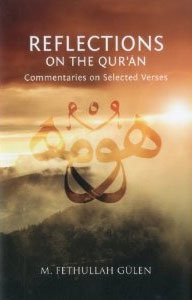Reflections on the Qur’an

Fethullah Gülen covers in his Reflections on the Qur’an a wide array of topics, ranging from piety, worship, sincerity, wickedness, hypocrisy, patience, gratefulness, to guidance, “sakinah,” reflection, humbleness, proper worship, and God’s “nur” or light. For example, on Surat-al Ahzab, verse 4, Mr. Gülen explains what is meant by, “God has not made two hearts for any man,” and how this is related to hypocrisy. Mr. Gülen writes that all people have the tendency to be worshippers of God and that if man does not worship God alone he will devote himself and his admiration to other things besides God; worldly things such as money, power, and fame. Mr. Gülen explains that this verse tells us to devote ourselves to God, because it is not possible for anyone to sincerely worship both God and something else. Therefore, people who are addicted to worldly pleasures can only pretend to worship God to please everyone around them, and the Qur’an refers to these kinds of people as hypocrites.
An important topic of the book is the histories of the various prophets mentioned in the Qur’anic verses. Mr. Gülen carefully examines what God is trying to teach us from these historical accounts of prophets like Moses, Solomon, and Muhammad, peace and blessings on them all. He explains how Solomon transported and disguised the Queen of Sheba’s throne, how and why the direction of the prayer was changed from the Dome of the Rock masjid to the Ka‘ba, and how Dhu’l-Qarnayn built the barrier between Gog and Magog.
Mr. Gülen writes in a clear and uncomplicated style from the perspective of decades of experience living an austere and self-sacrificing Sufi lifestyle in accordance with the Holy Qur’an. When reading I feel as though Mr. Gülen himself is teaching the reader, and I am reminded of Mr. Gülen’s sermons. Anyone who has had the honor to attend one of his lectures should find the style of this book to be friendly and familiar. Although there are a few topics covered which may be difficult to understand, such as God’s “Nur,” or “Light,” most of subject matter does not demand extended contemplation from the typical reader.
Even though most people who read the Holy Qur’an can read it fluently in Arabic, we must not forget that underneath the pleasant sounds lies knowledge and instruction for people of all years and all times past, present, and future. It is imperative for us to try to understand God’s Holy Book as best as we can. I believe that the Qur’an is full of wisdom for all of humanity, and I believe that the author of this book does an outstanding and efficient job of revealing that wisdom.
This article has first appeared in the 87th issue of Fountain Magazine (September - October 2012).
The Fountain can be reached online at http://www.fountainmagazine.com
- Created on .
